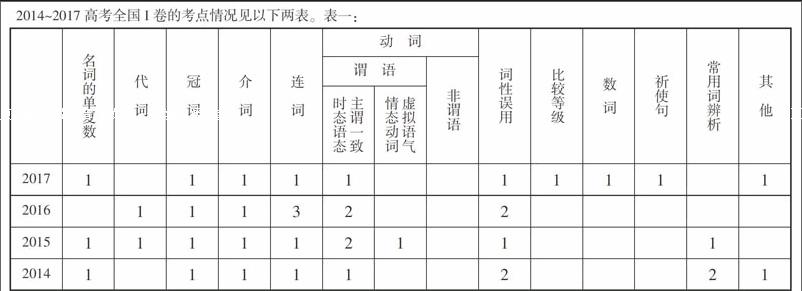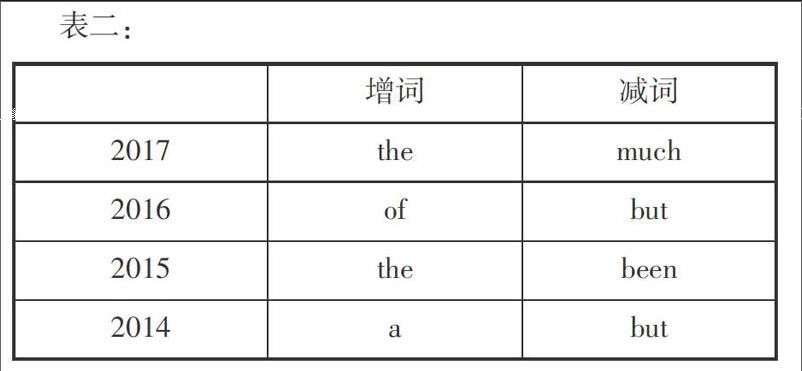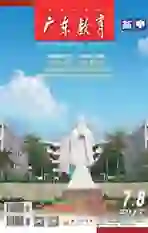短文改错的考点与解题口诀
2017-09-01陈龙玉
陈龙玉


一、考点分析
2014~2017高考全国I卷的考点情况见以下两表。表一:
由上表可知:
1. 短文改错的考点涉及面非常广,主要考点有:名词的单复数、代词、冠词、介词、连词、动词时态语态与情态动词、词性、比较等级、基数词与序数词、祈使句句型等。
2. 错误类型:错8个词、增1个词、减1个词,即错增减的比例为8∶1∶1。
3. 一增一减的主要词为:冠词、连词、介词、to(介词或不定式符号)、代词和助动词等。
二、解法口诀
短文改错的考点与解题方法可借助以下口诀来助记。
动词形,名词数,还要注意形和副。
代词格,细领悟,前后一致要过目。
连词冠词常光顾,介词短语需关注。
连冠介,to代助,一增一减可别误。
常用词,细辨析,即可区分正与误。
比较等级及其它,语义搭配对了不?
三、解题实例
以2014~2017年高考全国卷真题为例,说明如何运用解题口诀。
1. 动词形
动词形就是无论是谓语动词还是非谓语动词,动词错误就是形式错误,即要求考生改变形式。动词有原形、一般现在时第三人称单数、一般过去式、现在分词、过去分词、动名词等。
(1)(2017全国Ⅰ卷) Before getting into the car, I thought I had learned the instructors orders, but once I started the car, my mind goes blank.
(2)(2016全国Ⅰ卷)It is always crowded with customers at meal times. Some people even had to wait outside. My uncle tells me ...
(3)(2016全国Ⅰ卷)Every day he makes sure that fresh vegetables and high quality oil are using for cooking.
(4)(2015全国I卷)When I was a child, I hoped to live in the city. I think I would be happy there.
(5)(2015全国Ⅰ卷)We must found ways ...
(6)(2014全国Ⅰ卷)Since then—for all these years—we had been allowing ...
(7)(2017全國Ⅱ卷)Besides,they often get some useful information ... When summer came, they will invite their students ...
(8)(2017全国Ⅲ卷)I had grown not only physically, but also mentally in the past few years.
(9)(2017全国Ⅲ卷)I entered my second year of high school and become a new member of the school music club.
(10)(2017全国Ⅲ卷)About one month after this photo was took, I entered my second year of high school ...
(11)(2016全国II卷)We can chose between staying at home and taking a trip.
(12)(2016全国Ⅲ卷)I showed them I was independent by wear strange clothes.
(13)(2014全国II卷)My dream school look like a big garden.There are all kinds of flowers ...
答案:
(1)goes→went 时态一致。
(2)had→have 时态一致。
(3)using→used 被动语态的构成,是be加过去分词。
(4)think→thought 时态一致。
(5)found→find 情态动词后要用动词原形。
(6)had→have 由Since then—for all these years可知用现在完成进行时。
(7)came→comes 主句谓语动词will invite是一般将来时,从句应用一般现在时,主语是第三人称单数,故填comes。
(8)had→have 因in the past few years常与现在完成时连用,故改had为have。
(9)become→became 并列一致。
(10)took→taken被动语态的构成:be加过去分词,而take的过去分词是taken。
(11)chose→choose 情态动词后要用动词原形。
(12)wear→wearing在介词后要用动名词。
(13)look-looks 主谓一致。
2. 名词数
名词数就是名词主要考查名词的单复数,即可数名词其数量大于一时必用复数,不可数名词一般没有复数形式。此外,2011年全国I卷考查了名词的所有格。
(1)(2017全国Ⅰ卷)The instructor kept repeating the word, “Speed up!”“Slow down!”“Turn left!”
(2)(2015全国I卷)The airs we breathe in is getting dirtier and dirtier.
(3)(2014全国卷Ⅰ)Since then—for all these year—we ...
(4)(2013全国卷Ⅰ)He was tall, with broad shoulder ...
(5)(2012全国卷Ⅰ)I destroyed each of my toy.
(6)(2017全国Ⅱ卷)Besides, they often get some useful informations from the Internet.
(7)(2016全国Ⅱ卷)If we go on a trip abroad, we can broaden our view and gain knowledges we cannot get from books.
(8)(2016全国Ⅲ卷)The teenage year from 13 to 19 were the most difficult time for me.
(9)(2014全国II卷)For example, we can do reading for one and a half hour and play sports for one hour every day.
(10)(2011卷Ⅰ)I finally arrived at my friend ...
答案:
(1)word→words 后面有并列的三句话,故word用复数words。
(2)airs→air 因air为不可数名词,无复数形式。
(3)year→years 因year为可数名词,受all these修饰,故用复数。
(4)shoulder→shoulders 由常识可知,人有左右肩膀,故用复数。
(5)toy→toys因toy是可数名词,前有each of,故用复数。
(6)informations→information因information是不可数名词,没有复数形式。
(7)knowledges→knowledge 因knowledge为不可数名词,没有复数形式。
(8)year→years 由from 13 to 19或者were可知,year用复数。
(9)hour→hours 由one and a half可知,可数名词hour应用复数。
(10)my friend→my friends 因“到达我的朋友”显然不通,应是“到达朋友的家”。
3. 还要注意形和副
在高考的短文改错中,年年都考查词性误用,且主要是考查形容词和副词的误用,所以提醒考生要特别“注意形和副”。一般说来,作表语和定语应当用形容词,但文中却误用了副词或名词等;修饰动词、形容词或全句,作状语,应当用副词,但文中却误用了形容词。
此外,也还考查分词形容词的误用,即-ed形容词与-ing形容词的误用,以及名词作表语等情况。
(1)(2017全国Ⅰ卷)It was a relief and I came to a suddenly stop just in the middle of the road.
(2)(2016全國I卷)Instead, he hopes that his business will grow steady.
(3)(2015全国I卷)Lots of studies have shown that global warming has already become a very seriously problem.
(4)(2014全国I卷)We are growing wonderfully tomatoes at on cost!
(5)(2014全国I卷)The fruits are small in size, but juicy and taste.
(6)(2015全国II卷)Mom said,“How nice to see you again! Dad and I were terrible worried.”
(7)(2017全国Ⅲ卷)I enjoyed studying difference kinds of cars and planes ...
(8) (2016全国Ⅲ卷)At one time, I ever felt my parents couldnt understand me, so I hoped I could be freely from them.
(9)(2017全国Ⅱ卷) In their spare time, they are interesting in planting vegetables in their garden ...
(10)(2016全国Ⅰ卷)... the key to his success is honest.
答案:
(1)suddenly→sudden 在名词stop前作定语要用形容词。
(2)steady→steadily修饰谓语动词will grow,用副词作状语。
(3)seriously→serious在名词problem前作定语要用形容词。
(4)wonderfully→wonderful 在名词tomatoes前作定语要用形容词。
(5)taste→tasty 与形容词small, juicy并列一起作are的表语,用形容词。
(6)terrible→terribly 修饰形容词worried作状语,用副词。
(7)difference→different 在名词kind前作定语,用形容词。
(8)freely→free 在be后作表语,要用形容词。
(9)interesting→interested 表示人“对……感兴趣的”,用-ed形式;表示某事物是“令人感兴趣的”用-ing形式。
(10)honest→honesty 指“成功的秘诀”用名词“诚实”作表语。
4. 代词格,细领悟,前后一致要过目
人称代词作主语时用主格,作宾语时用宾语,有时会考查这一点。但在短文改错中,主要还是考查代词与其指代对象在人称、数、性等方面的一致问题,因此,“指代一致”要特别注意。另外,反身代词作宾语或作主语的同位语时,都必须与主语一致。
(1)(2016全国I卷)My uncle is the owner of a restaurant ... he hopes that our business will grow steadily.
(2)(2015全国I卷)We must find ways to protect your environment.
(3)(2013全國I卷)He had a deep voice, which set himself apart from others.
(4)(2012全国I卷)I was happy when the toys worked, but when things went wrong, I got angry and broke it.
(5)(2017全国Ⅱ卷)Mr. and Mrs. Zhang all work in our school.
(6)(2017全国Ⅲ卷)When I look at this picture of myself ... This picture often brings back to me many happy memories of your high school days.
(7)(2016全国II卷)If we go on a trip abroad, we can broaden your view...
(8)(2016全国Ⅲ卷)I thought I knew everything and could make decisions by yourself.
答案:
(1)our→his 应与主语he一致。
(2)your→our /the 应与主语We一致。
(3)himself→him 因与主语which不一致,不能用反身代词。
(4)it→them 应与前句中的the toys一致。
(5)all→both 应与主语Mr. and Mrs. Zhang一致。
(6)your→my 应与I,myself,me一致。
(7)your→our 应与主语we一致。
(8)yourself→myself 应与主语I一致。
5. 连词冠词常光顾
就是指连词和冠词常常考,事实上是年年考。
连词:
连词的考查包括and, but, or等并列连词之间的混用,以及从句连词的误用。
(1)(2017全国Ⅰ卷)Before getting into the car, I thought I had learned the instructors orders, so once I started the car, my mind went blank.
(2)(2016全国Ⅰ卷)... fresh vegetables or high quality oil are used ...
(3)(2016全国I卷)My uncle is the owner of a restaurant close to that I live.
(4)(2015全国I卷)In the countryside, the air is clean or the mountains are green.
(5)(2017卷Ⅲ)I have grown not only physically, and also mentally in the past few years.
(6)(2016全国Ⅱ卷)If we stay at home, it is comfortable but there is no need to spend money.
(7)(2016全国Ⅱ卷)My classmates and I are talking about how to do during the holiday.
(8)(2015全国II卷)After looking at the toy for some time, he turned around and found where his parents were missing.
答案:
(1)so→but 前后是转折关系。
(2)or→and 句意是指“用新鲜蔬菜和高质量的油”,而非表示选择关系,另外,谓语动词are也提示我们,主语是复数,指两者。
(3)that→where 指“靠近我住的地方”,表示“在……的地方”,用where引导宾语从句。
(4)or→and 前后非选择关系。
(5)and→but 因not only...but also是固定搭配。
(6)but→and 前后没有转折关系。
(7)how→what 作do的宾语要用代词what。
(8)where→that 宾语从句不需要任何意思了,所以用that引导宾语从句,或省略that。
冠词:
冠词主要考查a /an与the之间的误用,或者a与an之间的误用。此外,冠词漏用或多用也是常考的,详见“连冠介,to代助”。
(1)(2016全国I卷) My uncle says that he never dreams of becoming rich in the short period of time.
(2) (2015全国II卷) He liked it so much that he quickly walked into the shop... A woman saw him crying and told him to wait outside a shop.
(3)(2017全国Ⅱ卷) They live far from the school, and it takes them about a hour and a half to go to work every day.
答案:
(1) the→a 表示“一段”时间。
(2) a→the 特指上文提到的“那家”商店。
(3) a hour→an hour 表示“一”小时,用不定冠词,是对的;但hour的读音以元音形头,应当用an。
6. 介词短语需关注
(1)(2017全国Ⅰ卷)It was a relief and I came to a sudden stop just in the middle on the road.
(2)(2015全国Ⅰ卷)Unfortunately, on the development of industrialization, the environment has been polluted.
(3)(2014全國Ⅰ卷)... with the help by our father, my sister and I planted some cherry tomatoes(圣女果)in our back garden ...
(4)(2013全国Ⅰ卷)... a beard that turned from black towards gray ...
(5)(2016全国Ⅲ卷)Now I am leaving home to college.
答案:
(1)on→of 因in the middle of是固定搭配。
(2)on→with 因with the development of是固定搭配。
(3)by→of 因with the help of是固定搭配。
(4)towards→to 因from...to是固定搭配。
(5)to→for 因leave...for是固定搭配。
7. 连冠介,to代助,一增一减可别误
是指要求考生增加或删除一个单词的常常是连词、冠词、介词、to、代词或助动词等。
连词:
(1)(2016全国Ⅰ卷)Though not very big, but the restaurant is popular in our area.
(2)(2014全国I 卷)Although we allow tomato plants to grow in the same place year after year, but we have never had any disease or insect attack problem.
(3)(2013全国I卷) He had a deep voice, which set him apart from others in our small town, he was strong and powerful.
(4)(2011全国I卷)I bought my ticket but turned around to…
答案:
(1)去掉but,因已有连词Though,不再用连词。
(2)去掉but,因已有连词Though,不再用连词。
(3)在he was strong前增加and,因He had a deep voice与he was strong and powerful是两个句子,之间一定要用连词。
(4)将but改为and,因为“买票”与“转身”是两个先后发生的动作,不存在转折关系,用连词and。
冠词:
(1)(2017全国Ⅰ卷)I still remember how hard first day was.
(2)(2015全国Ⅰ卷)I miss my home in countryside.
(2)(2014全国I卷)As result, the plants are growing everywhere.
(3)(2013全国Ⅰ卷)In a fact, he even scared my classmates away ...
(4)(2017全国Ⅲ卷) Around me in picture are the things that were very important in my life at that time ...
(5)(2016全国Ⅱ卷) But in that case, we will learn little about world.
(6)(2016全国Ⅲ卷) At the first, I thought I knew everything and ...
答案:
(1)在序数词first前加the。
(2)在countryside前加the。
(3)在result前加a,因 as a result是固定搭配。
(4)在picture前加the。指在前文中提到的“那”张照片中。
(5)在world前加the。
(6)删除first前的the,因At first是固定搭配。
介词:
(1)(2016全国I卷)My uncle says that he never dreams becoming rich ...
(2)(2011全国Ⅰ卷)... he lent to me lots of clothes.
(3)(2017全国II卷)They have also bought for some gardening tools.
(4)(2017全国Ⅲ卷)When I look at this picture of myself, I realize of how fast time flies.
(5)(2013全国II卷) The book Im reading of talks about afternoon tea in Britain.
答案:
(1)在dream后增加of /about,因dream of /about是固定搭配。
(2)去掉lent后的to,可能是受lend sth to sb的影响而出错。
(3)去掉bought后的for,可能是受byu sth for sb的影响而出错。
(4)去掉realize后的of,因realize本身是及物动词,后面直接跟宾语从句,不用介词。
(5)去掉reading后的of,因read为及物动词,不再用介词。
to:
(1)(2017全国Ⅱ卷)When summer come, they will invite their students pick the fresh vegetables!
(2)(2014 全国II卷)We can lie on the grass for a rest, or sit by the lake listening music.
(3)(2012全国Ⅰ卷)I could make my toys to last.
答案:
(1)在pick前加to,因invite sb to do sth是固定句型。
(2)在listening后增加to,因listen to是固定搭配。
(3)删除last前的to,因make sb do sth是固定句型。
代:
(2016全国Ⅲ卷)I ... have my parents to turn to whenever need help.
(2015全国II卷) Five minutes later, Tony saw parents.
(2012全国Ⅰ卷)For a while, parents bought me new toys.
答案:
(1)在need前增加I,因状语从句中缺主语。
(2)在parents前增his,指Tony的父母。
(3)在parents前增加my,指“我的”父母给我买新玩具。
助:
(2015全国I卷) Lots of studies have been shown that global warming has already become a very serious problem.
答案:删除have后的been,因为这是主动语态。
8. 常用词,细辨析,即可区分正与误
(1)(2017全国I卷) A few minutes late, the instructor asked me to stop the car.
(2)(2017全国II卷) Beside, they often get some useful information ...
(3)(2016全國Ⅲ卷) However, my parents didnt seem to think such.
(4)(2015全国I卷) Much rare animals are dying out.
(5)(2014全国I卷) The fruits are small in size, but juicy and tasty. There are so much that we often share them with our neighbors.
(6)(2014全国I卷) Nearly five years before, and with the help of our father, my sister and I planted some cherry tomatoes in our back garden.
答案:
(1)late→later 表示多长一段时间之后,是“时间段+later”,而late作形容词,意为“迟的”,作副词,表示“迟到,晚”。
(2)Beside→Besides 因表“而且,此外”用副词besides,而beside是介词,表示“在……的旁边”。
(3) such→so表示“认为这样”,习惯上用代词so。
(4)Much→Many修饰可数名词复数(animals),要用many。
(5)much→many,替代可数名词复数(fruits),要用many。
(6) before→ago,指离现在多久以前,要用ago。
9. 比较等级及其它,语义搭配对了不?
(1)(2017全国I卷)The instructor kept repeating the words, “Speed up!”“Slow down!”“Turning left!”
(2)(2017全国I卷) In the summer holiday following my eighteen birthday, I took driving lessons.
(3)(2014全國I卷)As a result, the plants are growing somewhere.
(4)(2012全国I卷)I had to be more patient and little aggressive.
(5)(2017全国II卷) They often get up earlier and water the vegetables together.
(6)(2016全国Ⅲ卷)They were also the best and worse years in my life.
答案:
(1)Turning→Turn 祈使句以动词原形开头。
(2)eighteen→eighteenth 在第十八个生日。
(3)somewhere→everywhere根据语境可知,表达的意思为“到处”都是。
(4)little→less 由and可知,应与more一致,都用比较级。
(5)earlier→early 没有比较对象,用原级。
(6)worse→worst由and可知,应与前面的best保持一致。
短文改错考什么,如何解答这类题,有了口诀助记,我们相信,一定不会难了吧。
